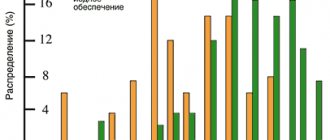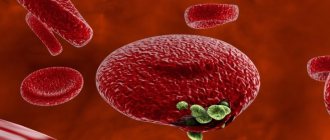Iodine deficiency is a disorder caused by a lack of iodine in the human body. Although iodine is present in the human body in very small quantities, it cannot be avoided. Modern science knows the only function of iodine in the body: it participates in the synthesis of thyroid hormones. With a lack of iodine, this function is impaired. There may be an enlargement of the thyroid gland (goiter formation). In regions characterized by iodine deficiency, such manifestations of iodine deficiency as hypothyroidism, cretinism, decreased fertility, increased infant mortality and a relatively high number of children with mental retardation are also detected.
What is iodine deficiency
This is the general name for diseases associated with a lack of iodine in the thyroid gland. There are four main diseases that arise against this background:
- Diffuse endemic goiter.
- Focal changes in the thyroid gland.
- Thyroid nodules.
- Functional anatomy.
It is worth considering the symptoms in order to detect the problem in a timely manner and consult a doctor. At an early stage, the disease can be cured much easier, preventing the development of a tumor.
Hypothyroidism in children
Hypothyroidism is a pathology in which the thyroid gland does not produce (or produces insufficient amounts) hormones such as triiodothyronine and thyroxine.
Hypothyroidism in children is usually divided into congenital and acquired.
Congenital hypothyroidism
The causes of congenital hypothyroidism can be heredity, genetic mutations and malfunctions, disturbances in the formation of the thyroid gland in the fetus (improper location of the organ or its absence), the presence of hypothyroidism in the mother during pregnancy, iodine deficiency during pregnancy, intrauterine damage and infections, etc.
In our country, in all maternity hospitals, screening is carried out to detect congenital hypothyroidism - on the 4-5th day of life (and in premature babies on 7-14), blood is drawn to determine the TSH level. Since the clinical manifestations of hypothyroidism become noticeable only after 3 months, early diagnosis and timely treatment prevents severe mental retardation in children.
Acquired hypothyroidism
It can be primary and secondary.
The group of primary acquired hypothyroidism includes everything associated with damage to the thyroid gland itself (damage to the neck, removal of the thyroid gland during surgery, autoimmune disorders, iodine deficiency, ionizing radiation to the neck area, etc.).
Secondary hypothyroidism is associated with disruption of the hypothalamic-pituitary system and its interaction with the target organ - the thyroid gland (neuroinfections, traumatic brain injuries, brain tumors, etc.).
Symptoms
If the body does not have enough iodine, it reports this in the form of weakness and loss of strength. This is the only element that allows thyroid hormones to function normally. But the first signal is often confused with simple malaise, as with an approaching illness. Therefore, you also need to pay attention to the presence of swelling. The limbs swell and bags appear under the eyes. When taking diuretics, the situation is aggravated, since almost all beneficial substances are washed out of the body.
There are several common symptoms of iodine deficiency:
- slight exhaustion;
- increased irritability;
- tendency to depression;
- lethargy;
- hypotension;
- metabolic disorder.
The goiter gradually begins to increase in size. If a person does not begin treatment, the following may develop:
- weaknesses;
- nervous disorders;
- arrhythmias;
- lack of hemoglobin;
- apathy;
- infertility and premature menopause;
- obesity.
Important. Thyroid problems are much less common in men than in women. In children, iodine deficiency can often be recognized when a goiter enlarges on the neck.
Sign up for a consultation
Have you noticed one or more symptoms?
Where to buy iodine?
Iodine is necessary for both men and women, influencing many processes in the body. It is of enormous importance for thyroid function, immunity, nervous system regulation, internal organ health, and much more. The body cannot produce it itself, so it is necessary to maintain the required level through food and supplements. In our online store you can get advice and choose the vitamin and mineral complexes that are right for you. Only proven products from global manufacturers that will benefit your health!
Thank you for reading the article and wish you good health! Sincerely, )
Causes
Doctors identify several reasons for the development of iodine deficiency:
- poor seafood diet;
- refusal of iodized salt when preparing food;
- distance from the sea;
- alcohol abuse;
- smoking;
- uncontrolled use of hormonal drugs by a doctor;
- bad genetics and predisposition.
Important. Iodine can also be supplied in the required amount, but the problem will still exist. This is due to problems of the gastrointestinal tract. That is, the intestines and stomach cannot absorb all the nutrients. Then a deficiency of this element may also occur. But the problem can be corrected by treating the gastrointestinal tract.
References
- Clinical guidelines: Diseases and conditions associated with iodine deficiency - 2022.
- Gerasimov G.A.: On new WHO and UNICEF recommendations for the prevention of iodine deficiency diseases - Moscow, 2008.
- Pharaoah P., Connolly K. Iodine and brain development // Developmental Medicine and Child Neurology, 1995; 38:464–9.
- E.A. Troshina, N.M. Platonov. Metabolism of iodine and prevention of iodine deficiency diseases in children and adolescents. – Endocrinological Research Center. - Moscow. -2008.
- Untoro J, Mangasaryan N, de Benoist B, Darnton-Hill I. Reaching optimal iodine nutrition in pregnant and lactating women and young children: programmatic recommendations // Public Health Nutrition. – 2007. – V.10, No. 12A. P.1527-152.
Diagnostics
Initially, you can do the test at home. You will need to draw three stripes of different lengths on your hand with iodine. If the shortest one disappears after 3 hours, then a small deficiency is present. If all the stripes disappear, then the element is missing in large quantities. This is not a professional diagnosis, but it allows you to understand whether a person has problems.
The doctor must examine the thyroid gland by visual examination and palpation, determining the size of the nodes. A survey is also administered to examine the presence of symptoms. Hardware diagnostics using ultrasound will also be required. Normally, the thyroid gland should be up to 4 cm in length, up to 1.5 cm in thickness and up to 2 cm in width. If there is a tumor in the tissues, various compactions can be detected.
If there is a suspicion of oncology, then a biopsy is required and the sample is checked during histological examination. In half of the cases, women also have breast problems due to iodine deficiency, so it is recommended to have a mammogram or ultrasound of the breast.
When should I get tested for IODINE DEFICIENCY?
- Diagnosis of iodine deficiency.
- Increased fatigue, deterioration of cognitive functions, slower reactions.
- Irritability, emotionality, depression.
- Hand tremors.
- Increase in body weight.
- Monitoring therapy with iodine-containing drugs.
- Living in iodine-deficient regions.
- Prevention of fetal pathologies caused by iodine deficiency during pregnancy.
- Goiter, protrusion of eyes.
- Diagnosis of iododerma, iodism.
Treatment
The treatment process comes down to replenishing the deficiency of this element. There are several ways to do this:
- Follow a special diet. It is recommended to include seaweed, ocean and sea fish, and other foods that contain a lot of iodine in your diet.
- Take medications that help increase the amount of iodine (Iodomarin, Iodbalan, Potassium Iodite, Alphabet, Vitrum, Multitabs).
- There is honey and green walnuts.
Iodine is well absorbed if the body gets enough protein, calcium, iron and zinc. Therefore, to prevent iodine deficiency, it is necessary to monitor your diet. Also, as a preventative measure, it is necessary to undergo a medical examination at least once a year. This will allow us to identify abnormalities at an early stage in order to prescribe an effective treatment plan using gentle drugs.
You can get a doctor’s consultation at our endocrinology center in Samara by sending an online application from the website or by calling. Be healthy!
Lack of iodine in the body: symptoms and prevention.
IODINE deficiency in the body: SYMPTOMS AND PREVENTION.
For the healthy functioning of the body, it is necessary to constantly maintain a balance of active substances - vitamins and minerals. One of them is iodine.
Iodine is a necessary element for the synthesis of thyroid hormones, which are responsible for the most important processes occurring in our body. If there is not enough iodine in food, almost all organs suffer. Iodine plays a vital role in the normal functioning of the thyroid gland.
Symptoms of iodine deficiency appear the same in both men and women. However, there are some peculiarities.
Signs of iodine deficiency in children. In a growing body, the need for iodine increases. Children who are deficient in this microelement often suffer from colds, their appetite is reduced, they quickly get tired from physical activity, and their school performance is poor. Iodine deficiency in children most often occurs hidden. An increase in the size of the thyroid gland and the development of a goiter indicate that the child’s body has long been experiencing iodine deficiency.
With the development of severe hypothyroidism due to iodine deficiency, the child begins to lag behind in physical, mental and mental development, and in the most severe cases, cretinism develops. If the signs described above appear, you should consult a doctor. The first symptoms of iodine deficiency are nonspecific, so it is difficult to determine the true cause of deterioration in health on your own.
External signs of iodine deficiency. As a rule, women strictly monitor their appearance. Therefore, they immediately notice such unpleasant changes as increased hair loss, brittle nails, aging skin, excessive dryness and flaking. All this may indicate a lack of iodine in the body, especially if a woman carefully takes care of herself. If iodine deficiency is confirmed, external influences are useless.
Constant fatigue from iodine deficiency. If, even if you have quality rest and a rational daily routine, you constantly feel tired, depressed, want to lie down, and are unstable to stress, then it is likely that you have an iodine deficiency. Ignoring these symptoms and trying to recover with strong tea and coffee, you can only make the situation worse. If iodine deficiency is not corrected, these unpleasant phenomena will take on more severe forms. They will develop into severe nervousness, irritability or even depression due to chronic fatigue. All this will negatively affect both your efficiency in terms of work and your appearance.
Iodine and menstrual irregularities. Some signs of iodine deficiency in the body are unique to women. So, irregular menstruation indicates a problem. As a rule, this kind of problem begins against the background of other symptoms.
Infertility due to iodine deficiency. If you have been trying to conceive a child for a long time, but are constantly failing, then get tested for iodine deficiency as soon as possible. If this suspicion is confirmed, you will be able to solve the problem and prepare for conception.
Intestinal problems due to iodine deficiency. When there is a lack of iodine in a woman’s body, the symptoms are often accompanied by intestinal upset. It manifests itself in the form of constipation, which is difficult to cope with using traditional methods.
Decreased brain activity due to iodine deficiency.
Iodine deficiency also affects mental abilities. When it occurs, it is extremely difficult for a woman to concentrate on work, and sometimes she is unable to solve complex problems. At the same time, memory deteriorates and reaction decreases.
If you find several signs of iodine deficiency in your body, the best course of action would be to consult a doctor. Only a specialist can confirm or refute your guesses, and also prescribe the most effective drug.
To avoid unpleasant symptoms of iodine deficiency, you should consider your daily diet.
It should contain in sufficient quantities: seafood and sea fish - they are the richest sources of this microelement; river fish, but it is worth considering that it contains less iodine than sea fish; beef; chicken or quail eggs; milk and dairy products; mushrooms; cereals; vegetables and herbs - potatoes, garlic, beets, radishes, tomatoes, eggplants, spinach, green onions, sorrel; fruits - oranges, lemons, melons, pineapples, persimmons. You can also use iodized salt when cooking. But you need to understand that during heat treatment a significant part of the beneficial substance is lost.
Now there are other products artificially fortified with iodine - mineral water, eggs, baby food, etc.
Rest in ecologically clean areas. A person receives iodine not only from foods, but also from air and water. Therefore, it is so important to regularly relax at sea or in a region whose soil is rich in this microelement. As a result, during your vacation you will be able to replenish your iodine deficiency without making any effort.
Iodine and preparation for pregnancy. A lack of iodine in a woman’s body, the symptoms of which you now know, is especially undesirable during the period of preparation for conception. Therefore, it is advisable to plan your pregnancy in advance; the exact plan of action should be discussed with your doctor. Signs of iodine deficiency may appear very mild. But it is important to detect them in the early stages to avoid complications. Even if you have vague suspicions, you can immediately take preventive measures by adjusting your diet. If there are obvious symptoms of iodine deficiency, you should not act at random; it is better to immediately consult a specialist. Delays in general development and defects in the organization of the nervous system are the possible consequences of iodine deficiency for a baby. And the expectant mother herself will suffer if there is not enough iodine in her body. In particular, high blood pressure will accompany pregnancy. Fortunately, not so often, but there are cases where a lack of iodine leads to the development of cretinism in a child.
How much iodine does a woman's body need during pregnancy? The daily requirement for pregnant women is 250-300 mcg of iodine.
Even if the expectant mother eats foods rich in iodine every day, it is rarely possible to completely replenish the reserves of this element in the body through food alone. The second half of pregnancy automatically, so to speak, increases the body's need for iodine. Oysters and squid, shrimp and scallops, mussels and crabs in small quantities may well be present in a pregnant woman’s diet. Why small? Still, for our table these are still exotic products; the body must learn to perceive them correctly. And the expectant mother does not need to experiment on herself, so you should not overeat with these seafood. Therefore, in addition to foods high in iodine, a pregnant woman must take special medications. They are prescribed by an endocrinologist, and every expectant mother should attend an appointment. In most cases, iodine preparations are used in combination with other microelements and vitamins. Perhaps the most common prescription is the drug Iodomarin 200 mcg/1 tab.
There may be certain contraindications to this prescription, so you cannot prescribe preventive treatment for yourself.
Iodomarin is prescribed to many expectant mothers; your task is not to skip taking the drug and to strictly follow the dosage. If the doctor has not prescribed anything else, there is no need for amateur activities. You can ask your doctor about this or that iodine-containing product, and he will tell you how and in what quantities the expectant mother can consume this product.
The consequences of iodine deficiency during pregnancy can be very serious. Among them: miscarriage in the first trimester, frozen pregnancy, impaired metabolism of the pregnant woman (excess weight), intrauterine growth retardation, late toxicosis, weakness of labor. A baby who does not receive enough iodine during uterine development may have disturbances in the functioning of the brain, disturbances in the functioning of the thyroid gland, excess weight of the fetus, as well as delayed sexual development of the child. Since most regions of the country are considered iodine deficient, all expectant mothers need to worry about iodine reserves in the body even before pregnancy.
When prescribing medications with iodine, you cannot refuse to take them. Any problematic issues regarding the supply of iodine in the body can be resolved by an endocrinologist, whom a pregnant woman should contact at least once in 9 months.
Pharmaceutical preparations with iodine
If the diet is not rich in iodine-containing products, dietary supplements will come to the rescue.
These can be either vitamin complexes with a wide range of elements (AlfaVit, Multi-tabs, Centrum, Vitrum, Complivit: multivitamins + iodine, Vitamins for children), or oligocomponent or single-component preparations (Iodomarin, Iodine-active).
There are also special complexes for expectant mothers (Vitrum Prenatal, Alphabet Mom's Health, Materna, Multi-tabs Perinatal).
Since iodine is better absorbed in combination with vitamins, selenium, copper and zinc, you can give preference to multivitamins. Then you will get other healthy elements.
But single-component drugs also effectively replenish iodine deficiency. Therefore, the choice of iodine-containing supplements is an individual matter. It is best to consult your doctor before purchasing a multivitamin complex.
Features of iodine absorption
Unlike most microelements, iodine is quite “independent”: the presence of other chemicals is not necessary for its absorption. But still, a number of conditions can affect this process.
Iron, zinc, cobalt, manganese, copper, calcium and selenium contribute to successful absorption. Vitamins A, C, E and D and a high protein diet also have a beneficial effect.
But fluorine, bromine, chlorine, as well as goitrogenic substances can interfere with and slow down the process of absorption of this microelement in the intestines. They are found in radishes, soybeans, all types of cabbage, broccoli, beans, carrots, turnips, radishes, and flax seeds.
How to make up for the deficiency
We get up to 90% of iodine from food (60% from animal products and 30% from plant products), the remaining 10% from water and air.
Residents of coastal areas are in the most favorable conditions. Here the soil, air, and food are saturated with vital halogen. But even those who live far from the sea can structure their diet in such a way as to receive the required daily requirement.
To help - a properly composed menu, as well as iodized salt and various dietary supplements. For example, a teaspoon of iodized salt contains almost 400 mcg of microelement, which will more than cover the daily requirement. Mineral water is also a valuable source of natural iodine.
When creating a daily menu, it is important to find out which foods contain a lot of iodine.






